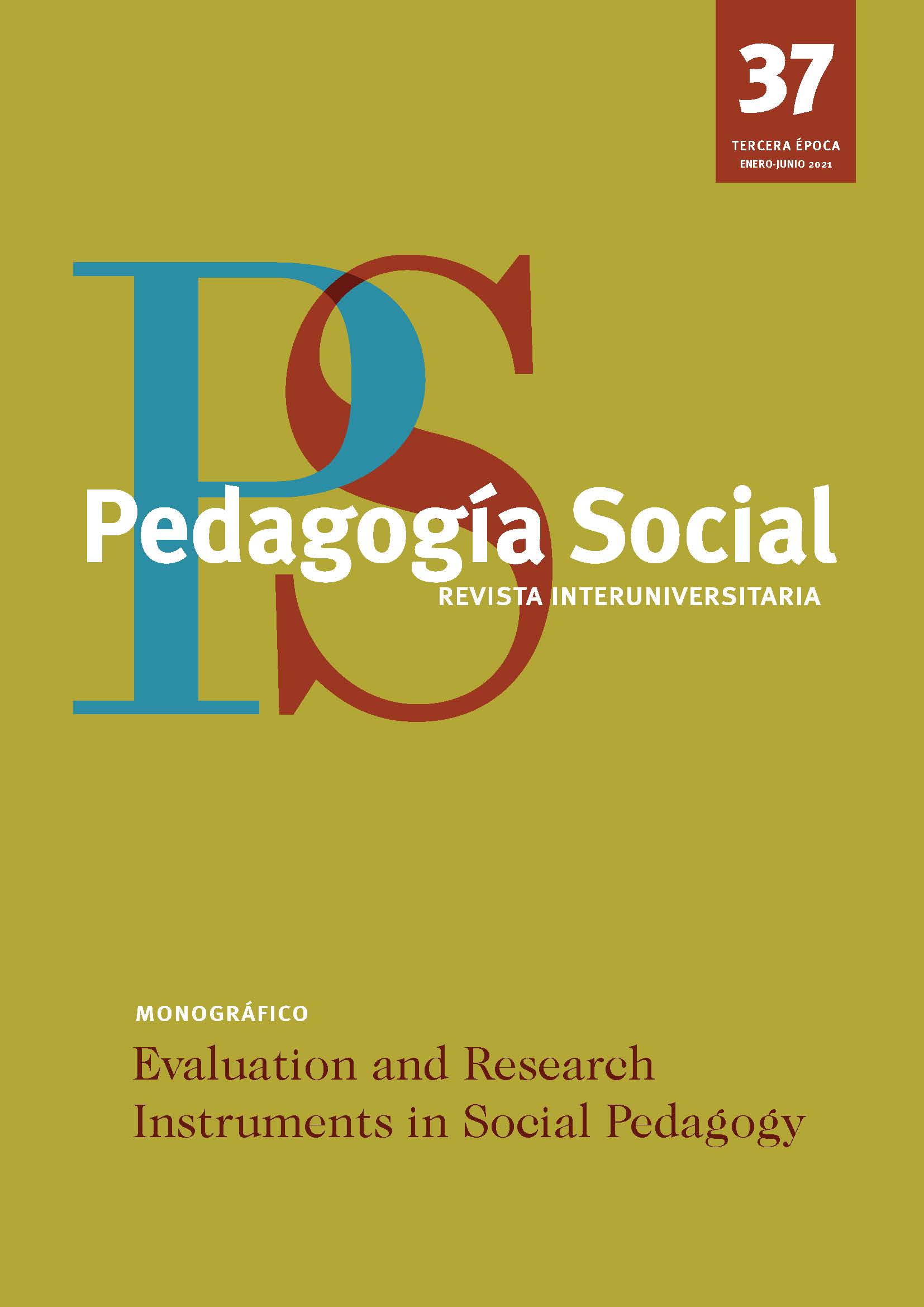Test situacional desarrollo de las competencias básicas de empleabilidad: validación de un instrumento psicoeducativo para la intervención socioeducativa
DOI:
https://doi.org/10.7179/PSRI_2021.37.02Palabras clave:
Empleabilidad, habilidades básicas de empleabilidad, habilidades clave de empleabilidad, test situacional, construcción de test, validación de test.Resumen
Las competencias básicas de empleabilidad, también denominadas competencias clave, son fundamentales para acceder, mantener y promocionar en el empleo, y son especialmente relevantes en la promoción de la inserción laboral de los jóvenes desfavorecidos.
En este estudio se describe el desarrollo de un instrumento psicoeducativo copyleft basado en el modelo de Arnau et al. (2014) que permite a los profesionales de la pedagogía social evaluar las competencias básicas de empleabilidad en adolescentes y jóvenes de 12 a 18 años: El Test Situacional de Desarrollo de Competencias de Empleabilidad.
Se diseñaron 29 situaciones-problema que se sucedían a lo largo de 5 historias de la vida cotidiana de cualquier adolescente. Se entrevistó a 102 adolescentes y jóvenes preguntándoles cómo reaccionarían ante dichas situaciones-problema. El análisis de contenido de dichas respuestas permitió seleccionar las respuestas más frecuentes indicativas de diferentes niveles de desarrollo competencial. 10 expertos asignaron las situaciones-problema a una de las 8 competencias propuestas por Arnau et al. (2014) y posteriormente asignaron puntuaciones de entre 0 a 5 a las diferentes respuestas en función del nivel de desarrollo que indicaban las respuestas, con altos niveles de acuerdo.
Después de una aplicación piloto a un grupo de 47 jóvenes, que permitió comprobar la variabilidad de las respuestas, se administró el test a 1011 jóvenes procedentes de 6 centros formativos. Del análisis factorial de las respuestas emergió una estructura unifactorial de 23 ítems, con valores elevados de ajuste del modelo y de fiabilidad.
Los resultados obtenidos avalan la validez de contenido, ecológica y de constructo del test DCBE recibiendo una buena aceptación tanto entre los alumnos como entre los profesores por su atractivo y utilidad. El test posibilita iniciar la preparación para la empleabilidad en etapas tempranas previas a la formación postobligatoria. Su carácter copyleft posibilita una amplia utilización por parte de los profesionales de la Pedagogía Social.
Descargas
Descargas
Publicado
Cómo citar
Número
Sección
Licencia
Derechos de autor 2021 Pedagogía Social. Revista Interuniversitaria

Esta obra está bajo una licencia internacional Creative Commons Atribución-NoComercial-CompartirIgual 4.0.
Derechos de reproducción y archivo
La versión publicada de los artículos podrá ser autoarchivada por sus autores en repositorios institucionales y temáticos de acceso abierto. No obstante la reutilización total o parcial de los mismos en nuevos trabajos o publicaciones deberá ser autorizada por Pedagogía Social. Revista Interuniversitaria.
Los trabajos publicados deberán ser citados incluyendo el título de la Revista, Pedagogía Social. Revista Interuniversitaria, nº, páginas y año de publicación.
Responsabilidades éticas
Pedagogía Social. Revista Interuniversitaria no acepta material publicado anteriormente en otros documentos. Los/as autores/as son responsables de obtener los permisos oportunos para reproducir parcialmente material de otras publicaciones y citar correctamente su procedencia. Estos permisos deben solicitarse tanto al autor/a como a la editorial que ha publicado dicho material.
Es obligación de Pedagogía Social. Revista Interuniversitaria detectar y denunciar prácticas fraudulentas.
En la lista de autores/as firmantes deben figurar únicamente aquellas personas que han contribuido intelectualmente al desarrollo del trabajo.
La revista espera que los/as autores/as declaren cualquier asociación comercial que pueda suponer un conflicto de intereses en conexión con el artículo remitido.
Los autores deben mencionar en el manuscrito, preferentemente en el apartado del método, que los procedimientos utilizados en los muestreos y controles han sido realizados tras la obtención de consentimiento informado.
La revista no utilizará ninguno de los trabajos recibidos con otro fin que no sea el de los objetivos descritos en estas normas.
Aviso de derechos de autor/a
© Pedagogía Social. Revista Interuniversitaria. Los originales publicados en las ediciones impresa y electrónica de esta Revista son propiedad del Pedagogía Social. Revista Interuniversitaria, siendo necesario citar la procedencia en cualquier reproducción parcial o total.
Salvo indicación contraria, todos los contenidos de la edición electrónica se distribuyen bajo una licencia de uso y distribución “Creative Commons Reconocimiento-No Comercial 3.0 España” (CC-by-nc). Puede consultar desde aquí la versión informativa y el texto legal de la licencia. Esta circunstancia ha de hacerse constar expresamente de esta forma cuando sea necesario.






